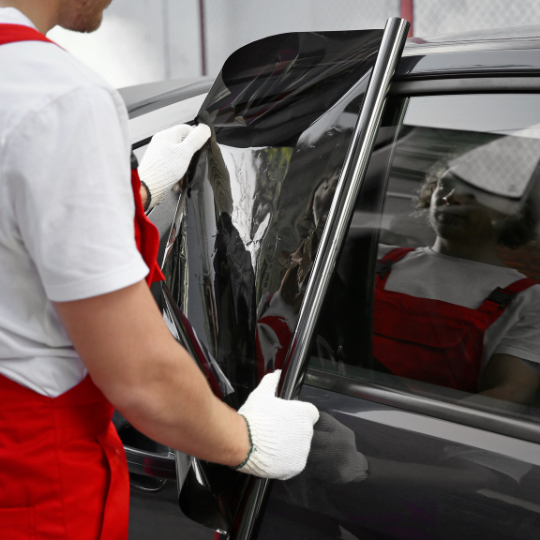When it comes to enhancing the aesthetics and functionality of your vehicle, few upgrades can match the impact of window tinting. Not only does it add a sleek, sophisticated look to your car, but it also offers practical benefits such as UV protection, heat reduction, and glare reduction. However, when considering window tinting, one of the first decisions you’ll face is whether to tackle the project yourself with a DIY kit or opt for professional installation. Each approach has its own set of pros and cons, and understanding them is crucial to making an informed decision.
DIY tinting kits are readily available and can be an attractive option for those looking to save money. With these kits, you have the freedom to tint your windows at your own pace and convenience. However, DIY tinting requires a certain level of skill and patience, as achieving a professional-quality finish can be challenging. Improper installation can result in unsightly bubbles, peeling, or even legal issues if the tint is too dark.
On the other hand, professional installation offers the expertise and experience of trained professionals. Professional installers have access to high-quality tint films and professional-grade tools, ensuring a proper and long-lasting installation. While professional installation comes at a higher cost than DIY kits, the quality and warranty-backed assurance may outweigh the upfront expense for many vehicle owners.
In this blog post, we’ll explore the pros and cons of DIY tinting versus professional installation, helping you make an informed decision for your vehicle.
DIY Tinting vs. Professional Installation
DIY tinting and professional installation are two common approaches to adding window tint to vehicles, each with its own set of pros and cons. DIY tinting appeals to those who are budget-conscious and enjoy taking on home improvement projects. It offers the
flexibility to work at your own pace and can be a rewarding experience for those who enjoy hands-on tasks. However, DIY tinting comes with risks, as achieving professional-quality results can be challenging for beginners. Improper installation can lead to bubbling, peeling, or even legal issues if the tint does not meet local regulations.
On the other hand, professional installation offers a range of benefits. Professional installers have the expertise and experience to ensure a proper installation. They also have access to high-quality tint films and professional-grade tools, resulting in a higher-quality finish compared to DIY tinting. Additionally, professional installations often come with warranties, providing peace of mind that the tint job is protected against defects.
Despite these benefits, professional installation comes at a higher cost compared to DIY tinting. Customers also need to schedule an appointment and may need to wait for availability, which can be inconvenient for some. Ultimately, the choice between DIY tinting and professional installation depends on factors such as skill level, budget, and desired quality. While DIY tinting can be a cost-effective option for those with the right skills and tools, professional installation is often the preferred choice for those seeking a high-quality finish and peace of mind.
DIY Tinting
DIY tinting, or do-it-yourself window tinting, is a popular choice for vehicle owners looking to add a touch of personalization and functionality to their cars. This process involves applying a thin film to the interior side of the vehicle’s windows, which can help reduce glare, protect against UV rays, and enhance privacy. While DIY tinting can be a cost-effective solution, it does come with its own set of challenges and considerations.
One of the primary advantages of DIY tinting is the cost savings it offers compared to professional installation. DIY kits are readily available and typically more affordable than hiring a professional tinting service. Additionally, tinting your windows yourself allows you to work at your own pace and convenience, without having to schedule an appointment or wait for availability.
However, DIY tinting also has its drawbacks. One of the main challenges is achieving a professional-quality result. Properly applying window tint requires skill and attention to detail to avoid issues such as bubbling, peeling, or uneven tinting. Additionally, DIY kits may not always provide the same level of quality or durability as professional-grade materials.
Before embarking on a DIY tinting project, it’s essential to research and understand the laws and regulations regarding window tinting in your area. Some regions have specific restrictions on the darkness of window tint, which could impact your choice of tint film.
Overall, while DIY tinting can be a cost-effective option for vehicle owners, it’s essential to weigh the pros and cons carefully and consider your skill level and comfort with DIY projects before proceeding.
Professional Installation
Professional installation of automotive window tinting offers several key advantages over DIY methods. One of the primary benefits is the expertise and experience of professional installers. These professionals have undergone training and have hands-on experience with various types of vehicles and tint films, allowing them to provide a high-quality installation that meets industry standards.
Another advantage of professional installation is access to high-quality tint films and professional-grade tools. Professional installers typically use premium tint films that offer better heat rejection, UV protection, and durability compared to DIY kits. Additionally, they have the tools and equipment necessary to ensure a precise and seamless installation, minimizing the risk of bubbling, peeling, or other issues that can arise from improper installation.
Furthermore, professional installation provides assurance of a proper, warranty-backed installation. Many reputable tint shops offer warranties that cover issues such as bubbling, fading, or peeling, giving customers peace of mind knowing that their investment is protected.
Overall, while professional installation may cost more than DIY methods, the benefits it offers in terms of expertise, quality, and warranty protection make it a worthwhile investment for those looking to tint their vehicle’s windows.
Factors To Consider
- Skill Level and Experience: Assess your comfort and proficiency with DIY projects. Tinting windows requires attention to detail and patience, especially when working with delicate tint films.
- Budget and Cost Considerations: Compare the cost of DIY tinting kits with professional installation quotes. Factor in the quality of materials and tools included in each option.
- Quality and Longevity: Consider the quality and longevity of the tint job. Professional installations often come with warranties and guarantees for a certain period, ensuring durability and quality.
- Legal Requirements: Research the legal requirements and regulations regarding window tinting in your area. Professional installers are typically familiar with local laws and can ensure compliance.
- Time and Convenience: Determine how much time you can dedicate to the tinting process. DIY projects may take longer, especially if you’re inexperienced.
- Access to Tools and Materials: Consider whether you have access to the necessary tools and high-quality tint films required for a professional-looking finish.
- Risk of Improper Installation: Recognize the risk of improper installation with DIY projects, which can lead to bubbling, peeling, and potential legal issues if the tint is too dark.
- Desired Outcome: Clarify your expectations and desired outcome for the tint job. Professional installers can offer advice and expertise to achieve the desired result.
Consider these factors carefully to make an informed decision that suits your needs and circumstances.
 Automotive Window Tinting
Automotive Window Tinting
Automotive window tinting is a popular customization option for vehicle owners looking to enhance both the appearance and functionality of their cars. Tinting involves applying a thin film to the interior of windows, which offers a variety of benefits.
One of the primary advantages of window tinting is its ability to block harmful UV rays from entering the vehicle. This not only helps protect the occupants from sunburn and skin cancer but also prevents the interior of the car from fading and deteriorating over time. Additionally, tinted windows can help reduce the amount of heat that enters the vehicle, keeping it cooler and more comfortable, especially during hot summer months.
Tinted windows also provide increased privacy and security for the vehicle and its occupants. The darkened windows make it harder for thieves to see inside the car, reducing the risk of break-ins. Moreover, in the event of an accident, the tinted film can help hold shattered glass together, reducing the risk of injury from flying shards.
From a cosmetic standpoint, window tinting can give a vehicle a sleek, sophisticated look. It can enhance the overall aesthetic appeal of the car and make it stand out on the road. Additionally, tinted windows can help reduce glare from the sun and headlights, improving visibility and safety for the driver.
Overall, automotive window tinting offers a range of benefits, from protecting the vehicle and its occupants to enhancing its appearance and comfort. Whether for practical or aesthetic reasons, tinting is a popular choice among car owners looking to improve their driving experience.
In the debate between DIY tinting and professional installation, both options have their merits and drawbacks. DIY tinting can be a cost-effective and satisfying project for those with the skills and patience to achieve good results. However, it also comes with the risk of improper installation and potentially lower-quality outcomes. On the other hand, professional installation offers expertise, access to high-quality materials, and the assurance of a proper, warranty-backed job. The decision ultimately depends on your budget, skill level, and desired outcome.
Whether you choose to tackle tinting as a DIY project or opt for professional installation, it’s important to do your research and weigh the pros and cons carefully. If you decide that professional installation is the way to go, consider reaching out to a reputable tinting service in your area for a consultation. They can provide expert advice and ensure that your tinting project is done right. Remember, a well-installed tint not only enhances the aesthetics of your vehicle but also provides practical benefits such as UV protection and heat rejection.




